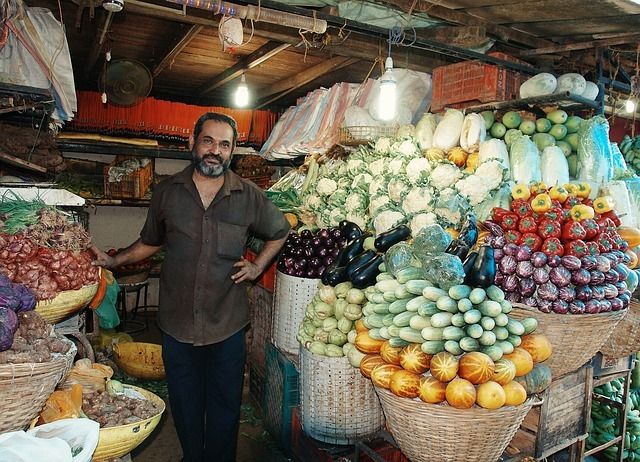Traditional Etiquette and Culture of Mumbai, India
Familiarising yourself with the culture in Mumbai, India is essential for any budding expatriate as India’s cultural norms are often of a stark contrast to our culture in the UK. Mumbai is the busiest city in India, and it is the nations very own “city that never sleeps”. The city’s natives lead a fast-paced and varied lifestyle, that incorporates a manifold of languages, food, entertainment and more. The Bollywood industry thrives in Mumbai, bringing a multi-billion-dollar industry to the city.
Dining in Mumbai
 When eating in Mumbai, it is crucial that you only ever eat with your right hand as your left hand is perceived as “dirty”, because it is used to clean feet, take off ones’ shoes, wipe ones’ bottom and other “unsanitary” things. You shouldn’t wipe your mouth or even pass food using your left hand, either.
When eating in Mumbai, it is crucial that you only ever eat with your right hand as your left hand is perceived as “dirty”, because it is used to clean feet, take off ones’ shoes, wipe ones’ bottom and other “unsanitary” things. You shouldn’t wipe your mouth or even pass food using your left hand, either.
It is important not to take a bite out of shared food and pass it on. Your lips shouldn’t touch another person’s meal. If you are sharing a drink, pour it into your mouth without it touching your lips. If you are sharing food, tear it and take a piece instead of taking a bite. You must wash your hands before AND after eating to maintain good hygiene and etiquette, and when serving food, the guests of honour will be first, then men, children and lastly the women will eat later. You should wait for the waiter or host to serve your food, rather than touching utensils with dirty hands from eating – in most places, you will need to eat with your hands or a spoon.
Greeting Neighbours in Mumbai
Similar to dining, you should be careful not to shake hands with anyone using your left hand – this is deemed as dirty and a rude gesture. You should be careful not to point with the left hand or put it in your mouth, either. It is normal for people in Mumbai to ask you questions upon meeting you. What may be considered rude or intrusive here in the UK, is the norm in India. The Mumbai people will ask you “personal” questions about your family, job, income and more.
When you greet someone, it is respectful to put your hands together in prayer and say “Namaste” with a slight bow – this is a good idea when welcoming someone of the opposite gender, as shaking hands isn’t proper. Men will sometimes shake hands in greeting, but this isn’t customary for women, especially not a man shaking a woman’s hand. It is crucial in India culture to greet the superiors first (the eldest).
Mumbai’s Dress Codes
Indecent dress like shorts or short skirts is not welcome or customary in Mumbai. It is important, especially for women, to dress modestly, and Indian women will generally cover their legs and shoulders. It will be considered offensive to wear skimpy clothes; only on the beach may it be acceptable.
When entering, or attempting to enter religious buildings like shrines and temples, it is courteous and of utmost importance that women dress respectfully or they will not grant you entry. When entering a Sufi Shrine, or any religious building, both men and women must cover their heads with a cap or cloth.
The Importance of Religion in Mumbai
As you may know, religion in India is sacred and showing disrespect towards religious buildings, teachings, practice, or buildings will rightly offend the people of Mumbai. Upon entering mosques or temples, it is customary to remove your shoes and leave them at the door. Socks are fine, however.
There are some prohibitions to adhere to when it comes to religious places of worship, too. Jain temples are likely to forbid entry to women who are menstruating. They will also restrict access to those carrying or wearing leather. Those who are non-Hindus may not be permitted in most Hindu temples. Those who do allow non-Hindus will ask that men remove their shirts before entering and that women wear long dresses or skirts.
Similarly, non-Muslims will not be allowed inside a mosque during the time of prayer and women can be withheld access at any time. Don’t take photographs of Deities or inside temples as Hindu people can be superstitious about this. You shouldn’t direct your feet (the soles) at a deity or touch one, either.
Social Etiquette in Mumbai

Hugging or kissing is considered a component of sex in Mumbai, and therefore it shouldn’t be done in public. Sometimes Indian men will hold hands due to a strong brotherly bond, but other than that, it is usually unseen. You must be mindful of your feet in Mumbai, for in India culture, it is seen as disrespectful to point the soles of ones’ feet at anyone. When entering someone’s home, too, you should do as your host does but in general, you will likely remove your shoes and try to avoid showing the bottom of your feet to anyone. Even if your feet accidentally touch someone, you should apologise right away.
Arranged marriages are standard in all of India, though the urban areas are gradually moving away from this tradition. Family values are sacred in India culture, where persons show great respect for the family hierarchy as well as its values. Women will obey the male figures – their husband, their father, and even their son. All of the ones’ elders should be respected, and using “sir” or “ma’am” is good practice.
Many Muslims may not have surnames; instead, men add their father’s name to their name with the connector ‘bin’, which means “the son of”. Some older females may be referred to as “auntie” as a form of respect, not due to the relation.
A few things to watch out for are gestures like waving as we do in the UK, for it is a sign for “no” or “go away” in parts of India. You should avoid touching someone on the head or getting in their personal space. Plus, ears are considered sacred, so don’t do things like pull ears.
